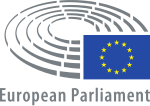| 6th European Parliament | |
|---|---|
| 20 July 2004 – 7 May 2009 | |
 | |
| President (1st Half) | Josep Borrell |
| President (2nd Half) | Hans-Gert Poettering |
| Commission | Barroso |
| Political groups | |
| MEPs |
|
| Elections | |
| Nice [nb 1] | |
The sixth European Parliament was the sixth five-year term of the elected European Parliament. It began on Tuesday 20 July 2004 in Strasbourg [1] following the 2004 elections and ended after the 2009 elections.
Contents
- Major events
- Activity
- Major resolutions and positions
- Committees
- Summary
- Temporary committees
- Committees of enquiry
- Delegations
- Political groups
- Leadership
- Presidents
- Vice-Presidents
- Quaestors
- Chairs of the political groups
- Membership
- Secretariat
- See also
- Elections
- Membership lists
- Notes
- References
- External links




